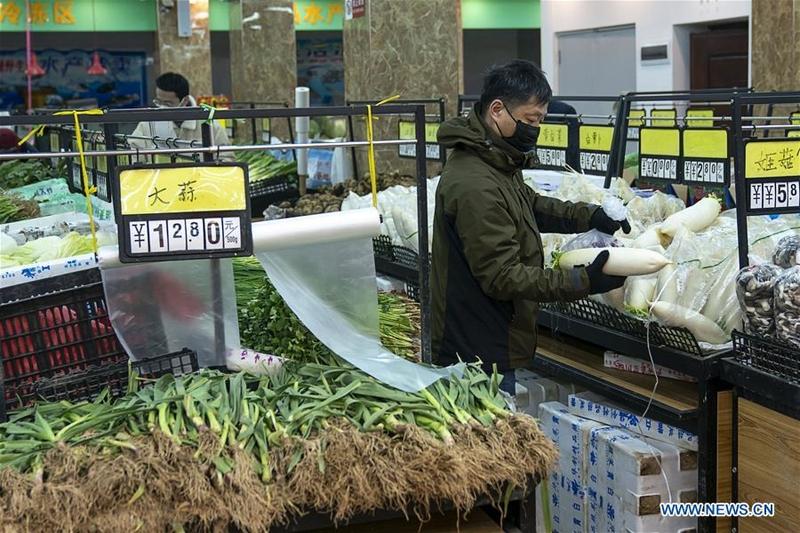 Residents shop at a market in Wuhan, capital of China's Hubei province, Jan 27, 2020, as efforts are being made to control the novel coronavirus outbreak. (XIONG QI / XINHUA)
Residents shop at a market in Wuhan, capital of China's Hubei province, Jan 27, 2020, as efforts are being made to control the novel coronavirus outbreak. (XIONG QI / XINHUA)
People who are stranded in Wuhan, Hubei province, after the city was put under lockdown to contain the novel coronavirus have been offered accommodations and government allowances, a civil affairs official said on Saturday.
Wuhan has been under lockdown since Jan 23. Transportation out of the city was suspended. Before that, many people from outside the city had come to Wuhan for family visit, tourism and work.
They have been stranded in the city after a series of traffic control measures were imposed to prevent the virus from spreading elsewhere. Some of them had no money to pay for accommodations and food while some were struggling with their lives because they had no income, according to Liu Xitang, director of the department of social relief of the Ministry of Civil Affairs.
READ MORE: Lock-down management lifted in low-risk areas in Hubei
By the end of Friday, 69 settlements have been set up around the city and 4,843 people who were stranded have moved in, said an official
"We have provided accommodations for those who had nowhere to stay. Those unable to work and no support from their families will receive government allowances to help them get through the tough times," Liu said at a daily news conference in Beijing.
On Feb 22, the city's civil affairs bureau decided to offer people who were stranded in Wuhan and facing severe difficulties 3,000 yuan (US$427.8) in cash as emergency allowances. The bureau also introduced a plan on Feb 27 to help non-Wuhan residents to ensure they could be taken care of, Liu said.
By the end of Friday, 69 settlements have been set up around the city and 4,843 people who were stranded have moved in. Also, more than 16 million yuan allowances have been sent to 5,839 people, he added.
Meanwhile, civil affairs authorities have been required to search for, and better care for, people unable to take care of themselves amid the novel coronavirus outbreak, Liu said.
ALSO READ: China boosts fiscal support for epidemic-hit poor people
Dependents in need of special care include those elderly and orphans living alone, the disabled from low-income families, and left-behind children, he said.
Local medical institutions have been required to inform local civil affair branches if quarantine measures would result in such people living alone at home.
"In that case, local authorities will send workers to care for those whose caregivers are quarantined," he said, adding that staff members from local civil affairs branches will also pay regular visits to those in need and offer them timely service.


